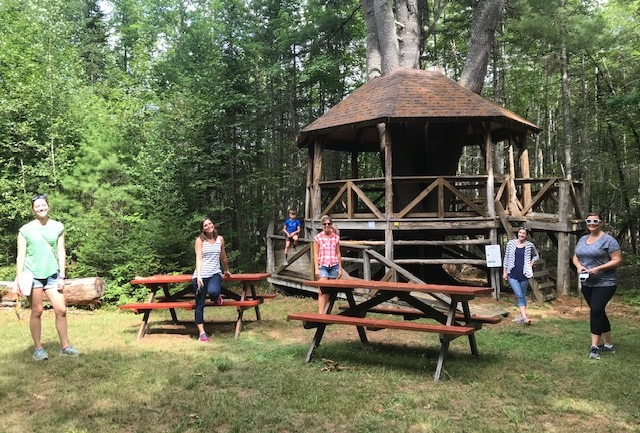
Connie and Ray Winship, a retired Waterville couple, were among the first to be vaccinated at the January 26 clinic. photo courtesy of Northern Light Inland Hospital
Northern Light Inland Hospital kicked off its first community vaccination clinic on January 26 for community healthcare workers and people age 70 and older in collaboration with Kennebec Valley Community College (KVCC) in Fairfield. 92 doses were administered on the first day at the KVCC vaccination site. Ongoing clinics will be added as the hospital learns of its vaccine allotment from the state each week.
“We are very excited to be moving into this phase of community vaccinations,” said Terri Vieira, hospital president. “We have started dose two of the vaccine with our own staff, and we’re pleased to be moving onward to vaccinate more people in the communities we serve. It’s progress, it’s hope. At the same time, we have to be patient as the vaccine supply is still significantly lower than we had hoped.”
To be able to make these mass vaccination clinics a reality, Inland Hospital needed a community partner to provide a large space, and KVCC stepped up to the plate in a big way.
“We are very grateful that KVCC is giving Inland, and our community, the support that is needed for these clinics,” noted Vieira. “They have long been our partner in healthcare, training many of our staff who work at the hospital and our medical practices.”
The college has opened its Carter Hall Multi-Purpose Center for the location of the community clinics.
“KVCC is so pleased to become part of the solution to the pandemic in our region,” stated Richard Hopper, KVCC president. “Besides providing the space, we are looking at how our students and faculty can play a role in helping at future vaccination clinics for second-round doses and the expansion of Northern Light’s program. Northern Light has been and continues to be a trusted partner of KVCC.”
Connie and Ray Winship, a retired Waterville couple, were among the first to be vaccinated at the January 26 clinic. Connie said, “We’re getting vaccinated because we want to be able to visit our kids and grandkids this summer – it’s been more than a year since we were together.” Ray commented, “Getting the vaccine gives us hope and makes us feel good that we are doing our part to get things back to normal.”
Vaccine Registration
Individuals must pre-register to take part in a vaccination clinic. Due to the high demand as well as the logistics around handling the vaccines, walk-ins cannot be accommodated. Community members should not show up at the KVCC site without an appointment. Each week, after receiving their vaccine allotment from the Maine CDC, Inland will open new clinics at KVCC based on that availability. The hope is to hold at least one clinic each week, but vaccine availability will determine how they can proceed.
Registration is available at covid.northernlighthealth.org/publicvaccine. For those who do not have internet access, call 207.204.8551 to reach the Vaccine Registration and Information line seven days a week from 9 am to 5 pm. Due to the strong community interest and very low vaccine supply, slots are few and filling up very quickly.
Preparing for Registration
When preparing to register, whether by phone or online, people are asked to have their insurance or Medicare information ready, and the name and phone number for an emergency contact person. The vaccine itself is free but a small charge to cover the cost of administration will be billed to people’s insurance.
At this time, community clinics will be for those 70 or over and community healthcare workers only per Maine CDC guidance.
For More Information
Community members are encouraged to visit covid.northernlighthealth.org/publicvaccine each Monday to learn about clinics that may be scheduled for the week. Or visit the Maine CDC website (www.Maine.gov) to see all vaccination sites across the state and any open appointments.
Inland Hospital leaders are asking individuals to please not call their primary care office or the hospital to try to register. The two options for registering at this time are on the website or the special registration phone line.
Submitted by Sara Barry, Director, Regional Marketing and Communications












 by The Town Line staff
by The Town Line staff